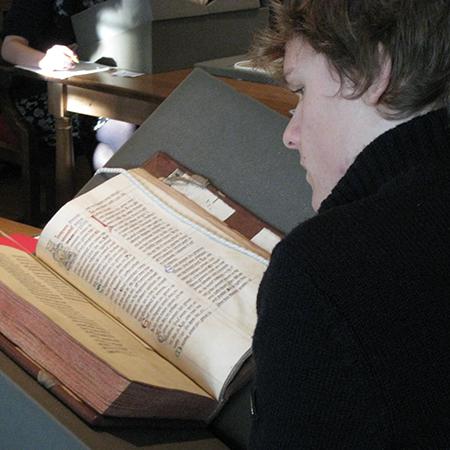Archive sessions
Our history students can participate in sessions in the College Library & Archives, an opportunity for them to examine at first hand items from the extensive collections of medieval manuscripts and early printed books. These are excerpts from two accounts of a recent first-year session:

Medieval documents are usually encountered by students in museums behind glass cases with explanatory notes, so it was unusual and very fun to get to handle real documents from Merton’s archives. Moving carefully around each of the documents, we were able to touch and come close—as long as we took great care—which allowed us as to see a range of things which were important enough to Merton over the years to be kept and preserved. … It was surprisingly satisfying to decipher faded ink and old handwriting—trickier than I would have thought. It also showed me that that reading is simply the first step, even if you think you have the words right. In addition to the text itself, it was interesting to look at the other aspects of the document such as the decoration or lack thereof. However, you need information to make sense of what you see. …The experience of handling these papers made me want to do more with original documents, because I enjoy having the building blocks and trying to solve a puzzle.
Elizabeth Biggs
As a first year, my reading lists were filled with secondary materials; many of the introductory materials were framed in such broad terms that they ended up being quite far removed from the original sources. And so it came as a bit of a surprise to see a sample of original manuscripts. …. With a faint recollection of Latin—and crucially without palaeographical training or any knowledge of Medieval Latin abbreviations—looking through the documents seemed a very exciting puzzle, and gradually, with some help, I was able to stumble through a few words.
I wasn't able to do very much with the documents—they were fascinating, but a bit beyond my grasp at the time. I think my chief impression was simply that being an actual historian was very different from what I was doing at the time, and that it seemed very exciting.
Ingrid Rembold